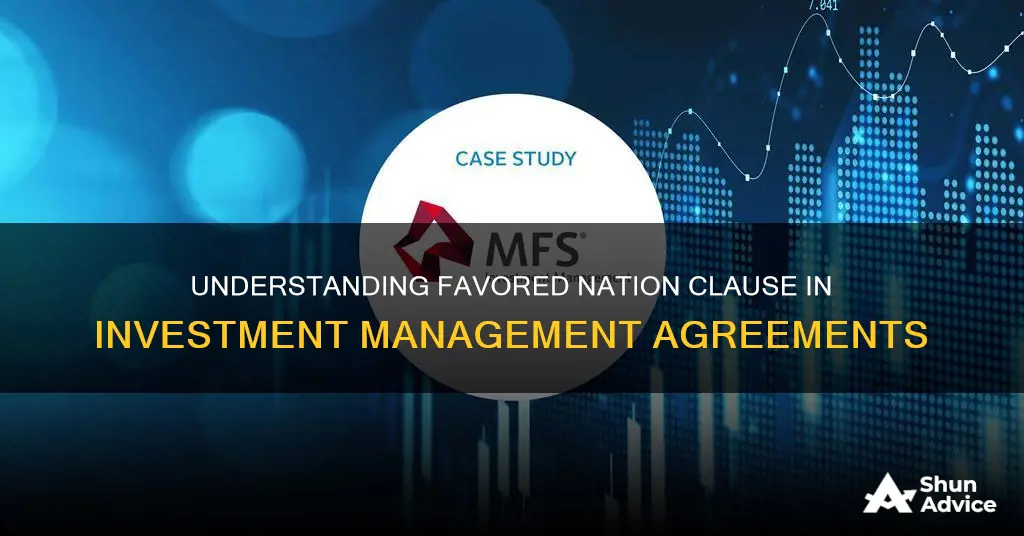
The Most Favored Nation (MFN) Clause is a term that originated from international trade agreements and is now used in investment management agreements. In international trade, the MFN clause requires countries to treat all trading partners equally by extending the same trade terms to each partner. This non-discriminatory trade policy is one of the founding principles of the World Trade Organization (WTO). In investment agreements, the MFN clause is included in investor agreements to ensure that an investor receives the same terms as the best deal offered to any other investor. This protects the investor's interests and maximizes their potential returns. The MFN clause is particularly common in early-stage startup investments, where investors may receive less favorable terms. However, the MFN clause can also limit a startup's ability to negotiate more favorable terms with future investors.
What You'll Learn

MFN clauses in investment agreements
The Most Favored Nation (MFN) clause is an important provision in investment agreements between early-stage startup founders and venture capital firms or angel investors. The clause ensures that an investor receives the same terms as the best deal offered to any other investor in the future. In other words, if the startup signs a subsequent agreement with more favourable terms, the investor with the MFN clause will automatically receive those terms.
The MFN clause is typically included in a Simple Agreement for Future Equity (SAFE) and can be triggered if the company offers more favourable terms to a future investor. A SAFE is a type of investment agreement commonly used in startup financing, acting as a straightforward and flexible way for founders to raise money from investors without giving up equity in their company upfront.
The MFN clause is used to protect the investor's interest in the valuation cap and discount rate. The valuation cap is the maximum valuation of the company at which the investor's SAFE will convert to equity. The discount rate is the percentage by which the investor's SAFE will convert at a valuation below the cap.
MFN clauses are advantageous for investors as they protect their interests and ensure they receive the best possible terms in the future. However, they can be detrimental to the company's future as they may limit the startup's ability to negotiate more favourable terms with future investors and may require the company to give up more equity than intended.
Invest Your Savings: Safe Strategies for Beginners
You may want to see also

MFN in international trade
The Most-Favoured-Nation (MFN) clause is a term that originates from international trade and has been in use for hundreds of years. It is one of the founding principles of the World Trade Organization (WTO) and requires countries to treat all their trading partners equally.
In international trade, the MFN clause is synonymous with non-discriminatory trade policy. This means that if a country belonging to the WTO reduces or eliminates a tariff on a particular product for one trading partner, the treaty's MFN clause obligates it to extend the same treatment to all members of the organization.
The WTO provides the following exemptions from MFN provisions:
- Trade blocs like the USMCA and the European Union, which are allowed to discriminate against imports from outside the bloc.
- Trade barriers in response to unfair competition.
- Trade preferences extended to developing countries.
- Trade in services, on a limited basis.
MFN clauses are also used in contracts and commercial arrangements to ensure that one party does not receive less advantageous terms than another. For example, a wholesaler may agree to a best-price agreement with a retailer, ensuring that the wholesaler will not supply their goods to another retailer at a lower price.
In the context of startup investing, an MFN clause ensures that an investor receives the same terms as the best deal offered to any other investor in the future. This can be particularly important in early-stage investments, where investors may receive less favorable terms.
Why Law Firms Need Managed IT Services
You may want to see also

MFN in contracts
The Most-Favored Nation (MFN) clause is a term originating from international trade agreements. It is also one of the founding principles of the World Trade Organization (WTO). MFN provisions in trade agreements refer to an extension of the same trade terms to all trading partners. As such, it is a non-discriminatory trade policy that ensures all partners in trade get the same treatment.
MFN clauses in contracts for products and services prevent sellers from offering said products and services to the buyer's competitors for a lower price or on better terms. In the context of finance, an MFN clause means that the first party will be entitled to at least as favourable terms as the second party in specified circumstances. For example, an incremental loan provision may have an MFN clause that says that the interest rate on the existing term loan will be increased so that it is not less than 25 basis points lower than the interest rate on the incremental loan.
In commercial transactions, an MFN clause is a contractual provision, also known as a most-favoured-customer clause, prudent buyer clause, or non-discrimination clause. Here, the seller promises the buyer that it will not offer another buyer better terms before offering those terms or better terms to the first buyer.
MFN clauses are also an important element of investment agreements between early-stage startup founders and venture capital firms or angel investors. The MFN clause ensures that the investor receives the same terms as the best deal offered to any other investor in the future. In other words, if the startup signs a subsequent agreement with more favourable terms, the investor with the MFN clause will automatically receive those terms.
The primary purpose of an MFN clause in an investment agreement is to give investors the comfort that they will not be disadvantaged compared to other investors in subsequent rounds, thus maximising their potential returns. MFN clauses can be useful for companies seeking to raise capital in a difficult market because they are attractive to investors. However, they can also be problematic for companies because they may need to offer better terms to entice a later investor, and they will also need to provide those terms to existing investors.
MFN clauses are highly advantageous for investors and offer minimal benefits to the startup. They protect the interest of investors and ensure that the terms of their agreement will always be at least as good as those for any other investor. For founders, MFN clauses can be detrimental to the company's future. For example, if the startup is able to negotiate a lower valuation cap or a higher discount rate with a subsequent investor, the first investor with the MFN clause will automatically receive those terms, which could be less favourable for the company.
Asset Managers: Brokers or Advisors?
You may want to see also

MFN in US trade legislation
In US trade legislation, the term "most-favoured-nation" is now described as "permanent normal trade relations" to avoid the implication that it confers preferential status. The US accords general most-favoured-nation (nondiscriminatory) treatment as a matter of statutory policy to all trading partners, except those whose MFN status has been suspended by specific legislation.
The US specifically accords to all foreign countries any concession on tariffs or other import restrictions agreed to in reciprocal negotiations with any trading partner. This is outlined in Section 126 of the Trade Act of 1974.
The US also accords MFN status reciprocally through bilateral compacts, such as a "friendship, commerce, and navigation" treaty, or an executive trade agreement. Another way is through membership in the World Trade Organization, which requires members to accord MFN treatment to all other members.
MFN status can be suspended or restored through various mechanisms, such as specific legislation, presidential determinations, or trade agreements. For example, the Trade Agreements Extension Act of 1951 suspended the application of MFN tariff rates to the Soviet Union and other countries under the control of international communism. On the other hand, the Trade Act of 1974 authorized the President to restore MFN status to a "non-market economy" country under certain conditions.
The US has also used the denial of MFN status as a measure in bills to reform unilateral economic sanctions legislation. For instance, bills have been introduced to withdraw MFN status from Lebanon and Syria as a sanction.
In 1998, legislation was enacted to replace the term "most-favored-nation" with "normal trade relations" in US statutes to avoid the misleading implication of preferential treatment. This change was included in the Internal Revenue Service Restructuring and Reform Act of 1998.
Understanding Investment Trusts: Attribution Management Explained
You may want to see also

MFN status loss
The loss of Most-Favored-Nation (MFN) status exposes a country to discriminatory import tariffs on its products. The US denies MFN status only to Cuba and North Korea. In 2019, India revoked Pakistan's MFN status following the Pulwama attack that killed over 40 CRPF personnel. In 2022, the G7 countries jointly withdrew Russia's MFN status in response to the invasion of Ukraine.
In the context of investment management agreements, a Most-Favored-Nation clause protects investors by giving them the same rights and benefits received by later investors if those rights are more favourable than those originally agreed. The primary purpose of an MFN clause in an investment agreement is to give investors comfort that they will not be disadvantaged compared to other investors in subsequent rounds, thus maximising their potential returns.
MFN clauses are most common in venture capital, particularly in early-stage investments, where a Simple Agreement for Future Equity (SAFE) or Convertible Note is used. This is because a SAFE is typically the first round of institutional capital a startup raises, so investors may receive less favourable terms.
The advantages of an MFN clause in an investment agreement are that it favours the investor by allowing them to access the same terms and conditions that might apply to future rounds of capital raising. When an MFN clause is present, it assures the investor that someone else will not be entitled to a better deal and that they will be treated fairly in a liquidity event.
However, MFN clauses can be problematic for companies because it means that if they need to offer better terms to entice a later investor, they must also provide those terms to existing investors. Depending on the specific conditions of a liquidity event, this may require the company to give up significantly more equity than originally planned.
In summary, the loss of MFN status in international trade relations can lead to discriminatory import tariffs, as seen in the examples of Cuba, North Korea, Pakistan, and Russia. In investment management agreements, the loss of MFN status for investors means they will no longer receive the same rights and benefits as other investors, potentially impacting their returns.
Strategies for Naming Investment Management Entities
You may want to see also
Frequently asked questions
The MFN clause is a term that originated in international trade agreements, which has been in use for hundreds of years. It is also a founding principle of the World Trade Organization (WTO). An MFN clause in a trade agreement means that all trading partners are treated equally and receive the same trade terms.
In investment agreements, the MFN clause is often included in contracts between early-stage startup founders and investors. It ensures that an investor receives the same terms as any future investor, if those terms are more favourable.
The MFN clause protects the interests of investors by ensuring they will not be disadvantaged compared to other investors. It provides security and assurance that they will receive the best possible terms in the future.
The MFN clause can limit a startup's ability to negotiate more favourable terms with future investors. It may also require the startup to give up more equity than originally intended if better terms are offered to subsequent investors.







